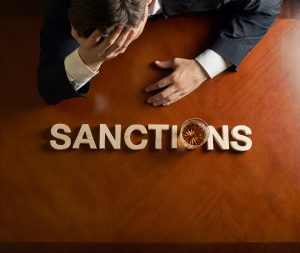What U.S. lawyers, accountants, and consultants must know when dealing with Russian clients
U.S. sanctions against Russia have gone beyond traditional asset freezes and financial prohibitions. Since 2022, they reach deeply into the realm of services, including accounting, legal, and management consulting.
For U.S. professionals, this means that what used to be routine international work – corporate formation, strategic consulting, tax planning, or even remote advisory sessions – may now expose a firm to serious civil and criminal penalties under U.S. law.
Related article: Overview of Russia Sanctions: Individuals and Companies on the SDN List
This article explains what these restrictions mean in practice, who is covered, what services are prohibited, and how American firms should manage their exposure when approached by Russian or Russia-linked clients.
OFAC expansive reading of Executive Order 14071
The U.S. Department of the Treasury’s Office of Foreign Assets Control (OFAC) enforces sanctions under Executive Order 14071, which prohibits the export, reexport, sale, or supply – directly or indirectly – of certain services to “any person located in the Russian Federation.” OFAC interprets this phrase broadly. According to OFAC, “a person located in Russia” includes:
1. Individuals physically in Russia;
2. Individuals ordinarily resident in Russia (even if temporarily abroad); and
3. Entities incorporated or organized under Russian law, including any of its jurisdictions.
In other words, if your client is in Russia, normally lives in Russia, or represents a Russian-registered entity, you may fall within the scope of these prohibitions – even if the engagement occurs entirely by email or Zoom.
Prohibited services: accounting, corporate formation, management consulting
Under the E.O. 14071 determination, the U.S. has prohibited the provision of services in several professional categories: accounting services (including bookkeeping, audit, and tax preparation);
trust and corporate formation services (such as registering companies, managing trusts, or providing nominee directors); management consulting services.
Management services are broadly construed to include:
1. Strategic business advice;
2. Organizational and system planning, evaluation, and selection;
3. Marketing program design or implementation;
4. Mergers, acquisitions, and corporate restructuring;
5. Staff augmentation and HR consulting;
6. Brand management;
7. Executive search and vetting services.
This list is intentionally expansive. The aim is to restrict U.S. professional expertise from supporting Russian business operations, whether directly or through subsidiaries or intermediaries.
Related article: Sanctions Against Russia: Sectoral Sanctions
Some legal and accounting work remains permissible
Not every interaction is forbidden. OFAC has clarified that U.S. persons may still provide certain legal services that are necessary to comply with U.S. law, such as:
• Representation in U.S. legal proceedings, arbitration, or regulatory matters;
• Advising on U.S. sanctions compliance itself;
• Responding to official U.S. government requests.
However, general corporate, transactional, or advisory work for a Russian entity remains off-limits without a specific license.
Similarly, accounting and consulting firms may not provide ordinary commercial or financial advisory services to Russian clients, unless authorized by OFAC.
Indirect or “third-country” scenarios
Many firms assume that routing work through non-U.S. affiliates – for example, London or Dubai offices – circumvents U.S. jurisdiction. That assumption is dangerous.
OFAC’s enforcement model is based on both nationality and control. If U.S. citizens, green card holders, or U.S.-incorporated firms are involved in rendering the service – even indirectly – the prohibition applies.
Examples from OFAC guidance illustrate this:
• A U.S. accounting firm providing tax services to a U.S. subsidiary of a Russian parent is permitted, as long as the work stays within the U.S. and is not reexported or shared with the Russian parent company.
• A U.S. consulting firm advising a subsidiary of a Russian company in a third country may proceed only if that subsidiary operates independently, with its own staff and business in that third country – and again, the advice cannot flow back to Russia.
But if a London or Dubai affiliate relies on U.S. personnel, systems, or intellectual property to service a Russian client, OFAC will treat that as an indirect export of U.S. services – a sanctionable act.
The “wind-down” period and general licenses
When the service prohibitions were introduced, OFAC issued General License 34, which allowed a brief “wind-down period” so that firms could legally terminate existing projects and close their Russian offices.
A general license is a blanket authorization – no need to apply individually – permitting certain otherwise prohibited activities under specific conditions.
In contrast, a specific license must be requested from OFAC on a case-by-case basis. Such licenses may authorize:
• Completion of pre-existing contracts;
• Payment of employee severance;
• Disposition of assets or winding up of entities.
Firms should never assume that humanitarian, reputational, or “low value” reasons are sufficient – all exceptions must be clearly covered by a license.
Understanding ownership and control in OFAC compliance
Navigating the intricacies of compliance becomes particularly challenging when a company is partially Russian-owned. At the heart of this complexity is OFAC’s 50 Percent Rule, which deems a company blocked if sanctioned persons collectively own 50% or more of it, directly or indirectly.
Even when Russian ownership falls below 50%, heightened due diligence is essential if Russian individuals exercise control or derive material benefits. To illustrate, consider these scenarios:
Majority U.S. ownership with a minority Russian stake: Generally permissible, provided Russian stakeholders lack control or veto rights. However, enhanced screening is strongly advised.
Majority ownership by a UAE company, which itself owned by a Russian firm: This setup often results in the entity being treated as Russian-controlled, regardless of the immediate parent company’s jurisdiction.
Majority ownership by a UAE company with Russian national shareholders: The risk level depends on the shareholders’ independence. If they operate autonomously and are not tied to Russia, the risk is lower. However, if funds or decisions trace back to Russia, OFAC may view the entity as Russian-linked.
The takeaway? A company’s formal registration in a neutral jurisdiction doesn’t negate Russian control risks.
Residency and the definition of “Persons in Russia”
OFAC’s term “persons located in the Russian Federation” extends beyond nationality. For example:
A dual U.S.-Russian citizen residing in Russia is considered “located in Russia.”
A Kazakhstani or Armenian national living and working in Russia also falls within this scope.
Conversely, a Russian national living abroad and integrated into another country’s economy—such as a long-term UAE or EU resident—may not automatically be classified as a “person in Russia.”
For compliance officers, the focus should be on where individuals live and conduct business, not just their nationality.
What counts as “providing a service”
Many professionals underestimate how broadly OFAC interprets “provision of services.”
Even if no contract is signed and no physical presence occurs, the following actions are considered service provision:
• Verbal advice over Zoom or phone calls;
• Email correspondence containing professional recommendations;
• Drafting or reviewing memos, analyses, or templates;
• Sharing internal tools or models used for client purposes.
Whether the advice is billed or provided informally makes no difference – if a Russian party benefits, a service has been provided.
Compliance challenges and gray areas
Some gray areas continue to generate uncertainty:
• Open-source tools: Sharing publicly available resources is generally permissible, but customizing or explaining them to a Russian client may cross the line.
• Multinational clients: If a large global company has Russian subsidiaries, U.S. firms must ensure their work is not reexported to those entities.
• Referrals and introductions: Referring a Russian client to a non-U.S. consultant may itself be considered “facilitating” prohibited activity.
When in doubt, firms should document their compliance analysis and, if necessary, seek interpretive guidance or a license from OFAC.
Penalties for violations
Violations of E.O. 14071 can lead to severe civil and criminal penalties.
• Civil fines may reach the greater of $368,136 or twice the transaction value per violation.
• Criminal penalties can include fines up to $1 million and imprisonment for up to 20 years.
The severity depends on intent. Accidental violations may be treated as civil; knowing or willful misconduct can trigger criminal prosecution.
OFAC considers self-disclosure and cooperation as mitigating factors. Firms that voluntarily report breaches often face reduced penalties.
Building a robust compliance framework
To operate safely, American professional firms should adopt comprehensive sanctions compliance programs that include:
1. Client screening – Verify ultimate beneficial owners (UBOs) and residency.
2. Service mapping – Determine whether proposed work falls within prohibited service categories.
3. Affiliate oversight – Ensure non-U.S. offices and contractors do not indirectly provide restricted services using U.S. resources.
4. Internal training — Educate partners and staff on identifying red flags (e.g., Russian payment methods, language, or IP addresses).
5. Licensing procedures – Establish clear processes for applying to OFAC when uncertain.
6. Recordkeeping – Maintain documentation of due diligence and client vetting decisions.
Even firms that believe they have no Russian exposure should perform periodic checks – sanctions lists and definitions evolve frequently.
The reputational dimension
Beyond legal risk, sanctions compliance is now a reputational benchmark.
Regulators, clients, and the media scrutinize cross-border engagements with heightened sensitivity. A single violation can lead to not only fines but also reputational damage, professional disciplinary actions, and loss of clients.
Firms that demonstrate proactive compliance – through transparency, clear policies, and risk awareness – are far better positioned to maintain trust and stability in an unpredictable geopolitical environment.
Key takeaways
• U.S. persons are broadly prohibited from providing certain categories of services to persons located in Russia.
• OFAC interprets “service” and “location in Russia” expansively.
• Even indirect or third-country arrangements can trigger violations.
• Exceptions exist only when explicitly authorized – via general or specific licenses.
• Firms must build rigorous compliance systems and document all assessments.
• When in doubt, seek OFAC guidance – not clever workarounds.
Final thoughts
The sanctions landscape has transformed the way American professionals engage internationally. Where once cross-border consulting and accounting were routine, they now demand legal precision, due diligence, and ethical clarity.
For U.S. law, accounting, and consulting firms, caution is not optional – it is the only compliance strategy that works.


